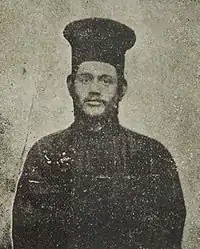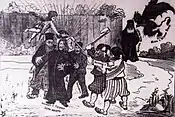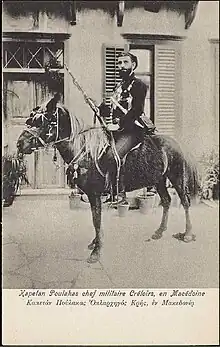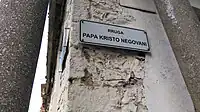Papa Kristo Negovani | |
|---|---|
 | |
| Born | 1875 Negovan, now part of Florina in Greece, then Manastir Vilayet, Ottoman Empire |
| Died | 12 February 1905 (aged 29–30) Negovan |
| Occupation | Teacher, Priest, Publisher |
| Period | 1895–1905 |
| Literary movement | Albanian National Revival |
| Notable works | |
Papa Kristo Negovani, born Kristo Harallambi and also known as Kristo Negovani (1875 – 12 February 1905), was an Albanian national figure, priest, poet, teacher, writer and publisher.[1][2][3]
Biography
Born as Kristo Harallambi in the village of Negovani, Manastir Vilayet, Ottoman Empire (now in Florina municipality, modern Greece), he became known in his lifetime as Kristo Negovani.[3] He had a brother who was a priest and had pro-Aromanian orientations.[4] His father was a merchant based in Athens, Greece and a young Negovani through a Greek scholarship pursued his secondary schooling in the Greek capital.[3][5] Negovani's father was killed by bandits in 1891 and he began working as a teacher in Greek schools.[3]
Later, Kristo Negovani emigrated to Brăila, Romania in 1894, joining other fellow migrants from Negovani and he worked as a carpenter.[3] There, he came into contact with the Albanian National Revival movement, developing in tandem with the Aromanian–Romanian national movement at the time, and attained Albanian national sentiments.[3]
In 1897, he returned to his native village and worked as a teacher and later also became a parish priest.[3] Over time, some several thousand people became followers of Negovani.[5] He performed mass in the Albanian language and taught children in their mother tongue.[3]

From 1899 onward, Negovani published works in Albanian such as fables and didactic poems, religious instruction texts and articles often composed as sermons in Albanian publications like the almanac Kalendari Kombiar and newspaper Drita.[1][3] Several notable works in Albanian by Negovani were the History of the Old Testament (1899), a History of the Bible (1903), and the Acts of the Holy Apostles (1906).[6]

Negovani opposed Greek propaganda and was against marriages with "foreign elements".[3] During 1905, Negovani, in the presence of Bishop Karavangelis[7] conducted the Orthodox Divine Liturgy in the Albanian Tosk dialect.[3][8][9] Karavangelis denounced the usage of Albanian in mass and under his orders had Negovani murdered.[9] The village of Negovani was attacked (12 February 1905) by Greek guerillas (andartes headed by Cretan captain Ioannis Poulakas) and Kristo Negovani along with his brother and three other villagers were killed.[10][3][9][11] Negovani's death aroused a nationalist response with the Albanian guerilla band of Bajo Topulli killing the Metropolitan of Korçë, Photios.[11][3][9]
Works
Negovani is the author of prose and poetry, including school texts, translations and fables. Among his publications are
- The History of the Old Testament, (Albanian: Istori e Dhiatës së Vjetërë), Bucharest 1889;
- The Destruction of Hormova, (Albanian: Prishija e Hormovësë), Sofia 1904;
- Little Dhonat Argjendi (Albanian: I vogëli Dhonat Argjendi), Costanza 1904;
- Works of the Holy Apostles (Albanian: Bëmatë të shëntorëvet dërgimtarë), Sofia 1906 https://www.strumski.com/books/NEGOVANI_1905.pdf;
- History of Plikati (Albanian: Istorishkronjë e Plikatit), Thessaloniki 1909.
References

- 1 2 Skendi, Stavro (1967). The Albanian national awakening, 1878-1912. Princeton University Press. pp. 206–207. ISBN 9781400847761. "In the south, the Greek guerillas were active and tried to suppress the Albanian movement by persecuting its supporters. In 1905 they assassinated the Albanian priest Papa Kristo Negovani because he taught Albanian and had published books in Albanian."
- ↑ Ramet, Sabrina (1998). Nihil obstat: religion, politics, and social change in East-Central Europe and Russia. Durham: Duke University Press. p. 206. ISBN 9780822320708. "The nationalist cause was given impetus in 1905 when the Albanian priest and poet, Popa Kristo Negovani, was killed by Greek chauvinists after he had introduced the Albanian language into Orthodox liturgy."
- 1 2 3 4 5 6 7 8 9 10 11 12 13 Clayer, Nathalie (2005). "Le meurtre du prêtre: Acte fondateur de la mobilisation nationaliste albanaise à l'aube de la révolution Jeune Turque" [The murder of the priest: Founding act of the Albanian nationalist mobilisation on the eve of the Young Turks revolution]. Balkanologie. IX (1–2). para. 7, 8, 26.
- ↑ Clayer, Nathalie (2007). Aux origines du nationalisme albanais: La naissance d'une nation majoritairement musulmane en Europe [The origins of Albanian nationalism: The birth of a predominantly Muslim nation in Europe]]. Karthala. p. 563. ISBN 9782845868168.
- 1 2 Blumi 2011, p. 166.
- ↑ Clayer, Nathalie (1999). "Le goût du fruit défendu ou de la lecture de l'albanais dans l'Empire ottoman finissant" [The Taste of the prohibited Fruit. The reading of Albanian at the end of the Ottoman Empire]. Revue des mondes musulmans et de la Méditerranée. 87–88: 231. ISBN 9782744900716.
- ↑ Blumi, Isa (2021). "Ottoman Albanians in an Era of Transition: An Engagement with a Fluid Modern World". In Chovanec, Johanna; Heilo, Olof (eds.). Narrated Empires: Perceptions of Late Habsburg and Ottoman Multinationalism. Springer. p. 207. ISBN 9783030551995.
- ↑ Ramet, Sabrina P. (1988). Eastern Christianity and politics in the twentieth century. Duke University Press. p. 9. ISBN 978-0-8223-0827-0. "Not surprisingly, language has been a salient issue in Orthodox church politics. Albanian Orthodox priest Papa Kristo Negovani was killed by Greek fanatics in 1905 when he tried to promote the Albanian language in schools and introduce it into the liturgy."
- 1 2 3 4 Blumi, Isa (2011). Reinstating the Ottomans, Alternative Balkan Modernities: 1800–1912. Palgrave MacMillan. p. 167. ISBN 9780230119086. "Negovani’s actions caused institutional responses that ultimately intensified the contradictions facing the church and its imperial patron. In the end, Papa Kristo Negovani was murdered for his acts of defiance of the explicit orders of Karavangjelis, the Metropolitan of Kastoria, who condemned the use of Toskërisht during mass."
- ↑ Kacza, Thomas (2007). Zwischen Feudalismus und Stalinismus: Albanische Geschichte des 19. und 20. Jahrhunderts. Trafo. p. 32. ISBN 9783896266118. "Im Februar 1905 überfielen fanatisch hellenophile Andarte das Dorf Negovani (bei Florina , Mazedonien) und richteten ein Blutbad an, dem unter anderen Papa Kristo (Harallambi) Negovani zum Opfer fiel"
- 1 2 Gawrych, George (2006). The Crescent and the Eagle: Ottoman rule, Islam and the Albanians, 1874–1913. London: IB Tauris. p. 91. ISBN 9781845112875. "In one case, a guerilla band executed Father Kristo Negovani (1875-1905) on 12 February 1905, two days after he had performed a church service in Albanian. To avenge his death, a guerilla leader named Bajo Topulli (1868-1930) waylaid and murdered Phiotos, the bishop of Görice, in September 1906."